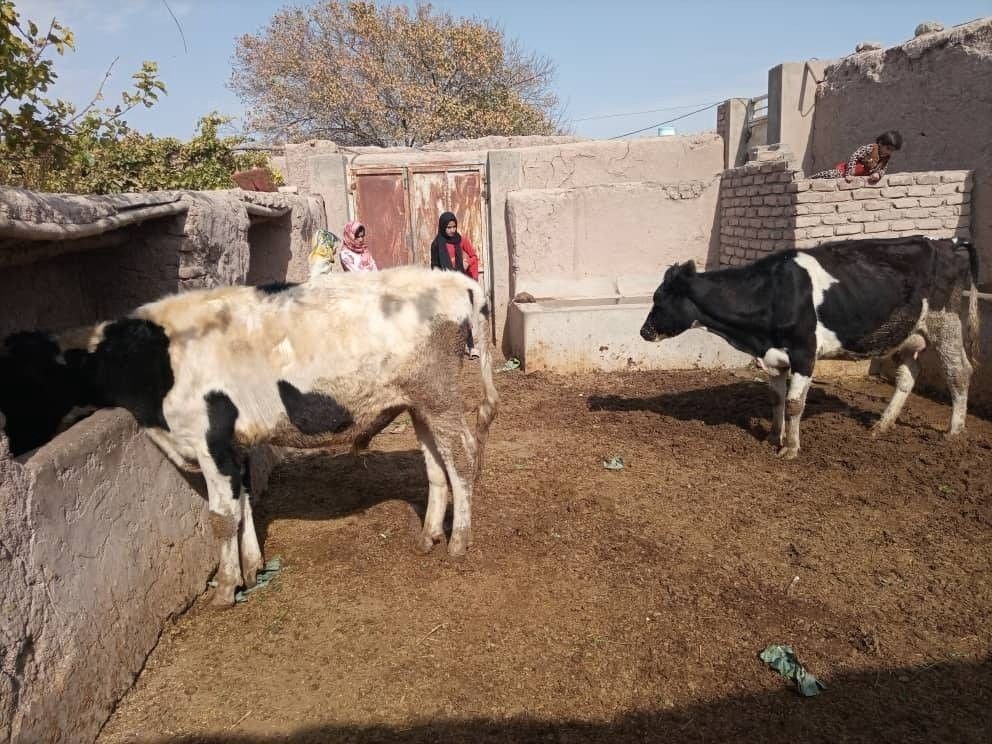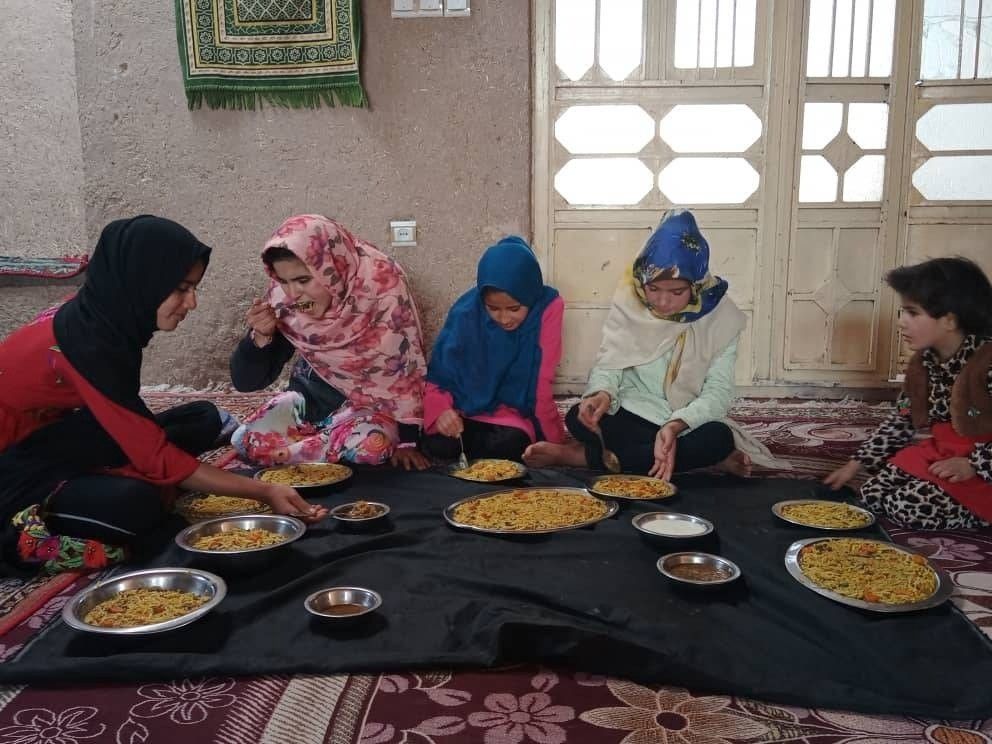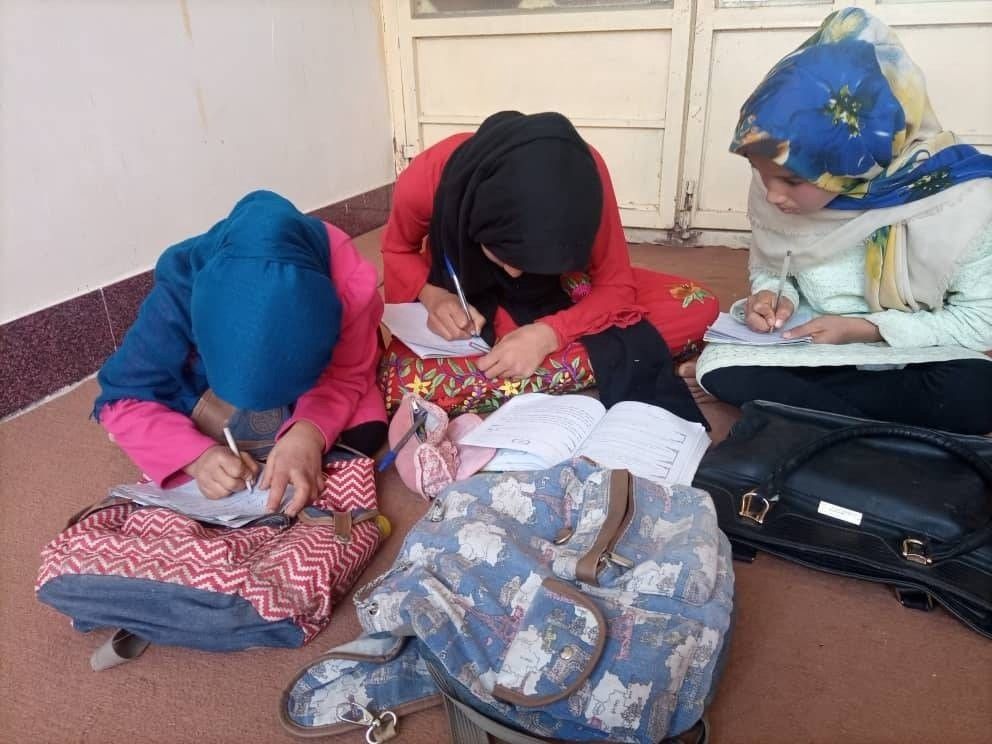Lots of Work, a Little Play

— One Day in Afghanistan —
Reporting by Abdul Karim Azim, edited by Mohammad J. Alizada and Brian J. Conley
Engil — “Mommy, hurry up, give us our school allowance so we can leave,” 15 year-old Khatera demands from her mom, a 38 year-old woman who requested to remain anonymous due to the cultural stigma in Afghanistan.
Khatera is one of seven children, all girls. They live with their 38 year-old mom and dad, 43 year-old Abdul Aziz, in Asad Beg village of Engil district in western Herat province. The village is about 12 kilometers from the capital city of Herat.
With mom rushing them away from home, the girl and her siblings get into a colorful Tuktuk with red doors, the body adorned in yellow and white, with a gray tarp covering, and drive off to school.
The Tuktuk owner, a neighbor, charges the family 2,400 Afghanis ($27) per month to take the girls to school. Herat is one of the provinces where schools for girls above 6th grade are open. The teachers’ union and educators in the province decided to open all schools last week. The Taliban have said they will provide no guarantee for the schools’ safety, which indicates rifts between the faction, an educator said.
Abdul Aziz’s children are 20 year-old Muzghan, 17 year-old Muzhda (given pseudonyms at the request of parents), Khatera, 13 year-old Sabria, 11 year-old Gulsum, 9 year-old Farzana and 5 year-old Rahima.
“If I had a son, we would be working together on the farm right now,” Abdul Aziz tells Alive in Afghanistan during an interview profiling his family. Despite having seven children, Abdul still wishes for a son. Having a son would mean the family would have help on the farm and not have to hire laborers, decreasing the farm’s revenue. In much of Afghanistan it is still unacceptable for girls or women to work as farmers or laborers.
With the Taliban taking control of Afghanistan following the government’s collapse in mid-August, the future of girls looks bleak and parents like Abdul Aziz and his wife find themselves in a tough situation. During the interview, Abdul Aziz can be heard sighing when talking about his family and his wish for male children is evident.
Apart from farming, the family also sells milk, yogurt and cheese, to earn enough in order to feed the family of 9.
As the clock ticks 10:30 am the girls return home from school. According to the girls, school hours are reduced from four to two hours as well, “due to the low motivation.” They hang their bags from the coat rack and come outside after a few moments.
When they returned the girls have changed out of their school uniform, which consists of a white scarf and black dress, into colorful clothes. They draw some lines on the cement balcony and start to play. The play is called “Late”, a version of hopscotch. First you draw two rectangle boxes on the ground and two players try to push a flat rock across the box while hopping on one foot, trying to keep your balance. Your rock must exit the rectangle first for you to win, but if both of your feet touch the ground, you lose.
Khatera loses very quickly and now it’s Sabria’s turn. The girls keep playing and laughing.
“Don’t forget to feed the cows!,” mom tells the girls.
“Yes mom, we are going to do that now!” Khatera yells back. All four of the girls stop playing and head towards the stable. They lead the cows out of the barn and Sabria, with the help of Gulsum and Farzana, brings them hay in a large bag and empties the hay into the hay trough. The cows start chowing down and the girls get busy cleaning the barn.
The day is passing by slowly, by now it’s just 11:20 am. After coming back from the barn, the girls get their jump ropes and start skipping rope.
“Shab, roz, Parwana, dewana (night, day, butterfly, crazy — Night or day, butterflies are crazy),” the girls sing in unison while one of them skips. Sabria is the best at it, at least today.
Each one of them does it as long as they can while the others watch. Farzana is so excited to skip rope for the camera that she forgets to jump and the rope hits her legs every time she skips, but she giggles about it while looking at her sisters.
At this moment, Abdul Aziz enters the house with a shovel on his shoulders and yells, “Hey woman, what’s for lunch? We have a guest.”
“Please don’t concern yourself with me, I can eat elsewhere,” I tell him.
“Guests are God’s friend,” Abdul Aziz says, insisting that I stay for lunch.

“Bring me some water!” The mother tells her girls. Khatera and Sabria both run towards the well in their yard and return carrying water for their mother in a steel bucket.
“Woman, get the food ready because I am going to head back to the farm,” Abdul Aziz tells his wife as the clock ticks 12 pm.
“Why are you in such a hurry? Wait a little,” his wife responds calmly.
The mother has prepared macaroni for lunch. Four of the girls sit around a black linen sheet in the guest room while the older sister and mother bring out the food on stainless steel plates. The girls eat hungrily while their mother and the older girls, together with 5 year-old Rahima eat in another room.

After serving lunch, Khatera and Sabria get into an argument about cleaning the linen and washing the dishes. Khatera wins and puts the responsibility of washing the dishes on her younger sister, Sabria.
“Did you feed the cows?” Abdul Aziz asks the girls.
“Yes dad, we fed them together,” the girls respond in unison, adding that they also cleaned the barn.
Abdul Aziz, who has been a farmer for most of his life says, “There are a lot of issues here, on the one hand, agriculture and farming does not make good revenue, on the other, it also requires a lot of work and the expenses are high.”
The unaffordable prices of fertilizer and pesticides, and the increase in prices for fuel — necessary to run the water pump that irrigates his farm — are issues Abdul Aziz faces as a farmer.
With that, Abdul Aziz returns to his farm and now it is time for little Rahima to go to school. Rahima, who has now finished lunch, requests her older sister to dress her in the school uniform, which the older sister accepts with a smile. The school is only 50 meters from their home and Gulsum takes little Rahima by hand and guides her there.

Among the four girls, Khatera and Farzana are interested in studying and becoming doctors, but Sabria likes teaching and wants to become a teacher for future children. Although their mother is working hard to put the girls through school, the recent developments in Afghanistan; unemployment and lack of income, have made a negative impact on the family.
“My children will not be able to continue studies if the situation persists,” their mother says.
The girls gather their school bags, huddle together in a room and start doing their homework. The older girls sweep the yard and house while the younger ones are doing homework. Their mother takes an afternoon nap. One of the older girls comes over after a while and helps the sisters with their homework.
Unlike the morning, winter afternoons are quick to pass.

